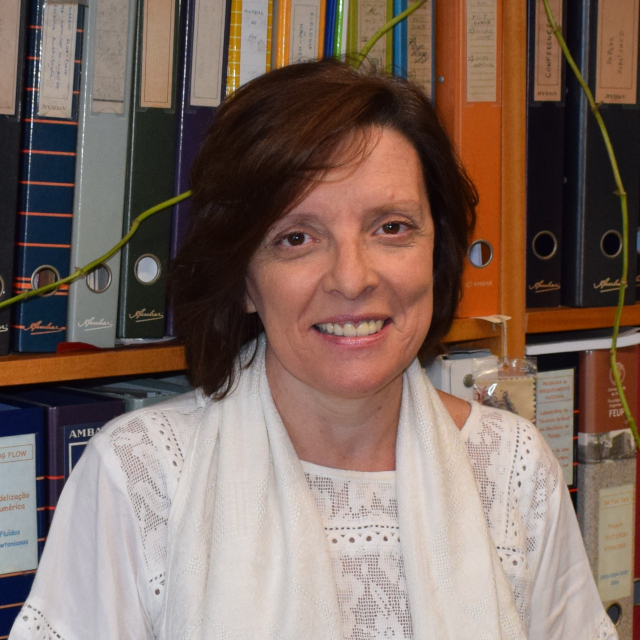Alexandra Pinto
About
In an early stage of her career, after PhD in 1991 on Combustion, oriented her activities to the Transport Phenomena area with particular interest in Mass Transfer and Characterization of two-phase flow patterns using advanced optical techniques. More recently, integrated the know how acquired with other skills of the core formation in Chemical Engineering, in Energy applications in particular in the Fuel Cell area, namely the Direct Methanol and Ethanol Fuel Cells (modelling and experimental studies, macro and micro scale), Microbial Fuel Cells, PEM Fuel Cells and Electrolysers and Hydrogen Generators and Storage (Chemical Hydrides) systems.
The main target is the development of solutions to efficiently produce energy for different applications which is strategically aligned to Horizon 2020 goals. Impact is expected in the transports sector (by increasing the Hydrogen storing capacity and PEM fuel cells optimization), in the wind sector (by developing more efficient PEM fuel cells and electrolysers for an alternative back-up power system) and in the portable sector (by designing micro direct alcohol fuel cells). By converting a variety of materials such as complex organic wastes or renewable biomass into electricity, Microbial fuel cells can be advantageously combined with applications in wastewater treatment.
Director of the Doctoral Program in Chemical and Biological Engineering (PDEQB), Chemical Engineering Department, FEUP, Portugal, since 2010. The program has an average number of 90 PhD students and produces around 14 PhD theses per year.
Was a member of European Network FCTESTNET (Fuel Cell Testing and standardisation Network).Is regularly invited to be an expert evaluator of Horizon 2020 Projects – Storage – Low Carbon Energy, FCH – Fuel Cells and Hydrogen, ITN – Marie Sklodowska-Curie
Research interests
Fuel Cells, Hydrogen Production and Storage, Renewable Energy, Transport Phenomena
Selected publications
- A.M.F.R. Pinto, V.B. Oliveira and D.S. Falcão, Direct Alcohol Fuel Cells for Portable Applications, Academic Press, 2018.
- D.S. Falcão, J.P. Pereira and A.M.F.R. Pinto,Effect of stainless steel meshes on the performance of passive micro direct methanol fuel cells, International Journal of Hydrogen Energy, 41 (31), pp. 13859-13867, 2016.
- R. Ferreira, D. Falcao, V. Oliveira and A. Pinto, Experimental study on the membrane electrode assembly of a proton exchange membrane fuel cell: effects of microporous layer, membrane thickness and gas diffusion layer hydrophobic, reatment, Electrochimica Acta, 224 (pp. 337-345 (339), 2017.
- R.B. Ferreira, D.S. Falcao, V.B. Oliveira and A.M.F.R. Pinto, 1D+3D two-phase flow numerical model of a proton exchange membrane fuel cell, Appl Energ, 203 (pp. 474-495, 2017.
- H. Nunes, M. Ferreira, C. Rangel and A. Pinto, Hydrogen generation and storage by aqueous sodium borohydride (NaBH4) hydrolysis for small portable fuel cells (H-2 – PEMFC), International Journal of Hydrogen Energy, 41 (34), pp. 15426-15432 (15427), 2016.
- V. Oliveira, J. Pereira and A. Pinto, Modeling of passive direct ethanol fuel cells, Energy, 133 (pp. 652-665 (614), 2017.
- V. Oliveira, C. Rangel and A. Pinto, Modelling and experimental studies on a direct methanol fuel cell working under low methanol crossover and high methanol concentrations, International Journal of Hydrogen Energy, 34 (15), pp. 6443-6451 (6449), 2009.
- V. Oliveira, M. Simoes, L. Melo and A. Pinto, Overview on the developments of microbial fuel cells, Biochemical Engineering Journal, 73 (pp. 53-64 (12), 2013.
- V.B. Oliveira, M. Simoes, L.F. Melo and A.M.F.R. Pinto, A 1D mathematical model for a microbial fuel cell, Energy, 61 (pp. 463-471, 2013.
- A. Pinto, D. Falcao, R. Silva and C. Rangel, Hydrogen generation and storage from hydrolysis of sodium borohydride in batch reactors, International Journal of Hydrogen Energy, 31 (10), pp. 1341-1347 (1347), 2006.

